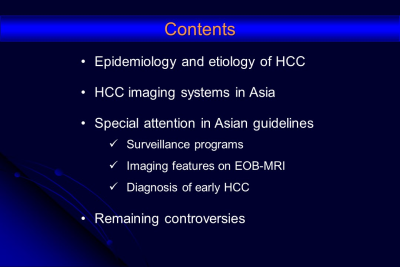Diverse Perspectives on Imaging-Based Diagnosis of HCC
Diverse Perspectives on Imaging-Based Diagnosis of HCC
Weekday Course
Weekday Course
ORGANIZERS: Mustafa Shadi Bashir, Utaroh Motosugi
Monday, 13 May 2019
| Room 516C-E | 16:00 - 18:00 | Moderators: Johannes Heverhagen, Mustafa Bashir |
Skill Level: Intermediate to Advanced
Session Number: M-08
Overview
Hepatocellular carcinoma (HCC) is a most common primary liver cancer, specifically developing in cirrhotic liver. Imaging has an important role in the management of HCC because biopsy or pathological evaluation is not typically required to make the final diagnosis of HCC; in other words, treatment decisions, e.g. whether or not liver transplantation is performed, can be made only by MRI. Therefore, guidelines/criteria of the diagnosis have been published by certificated organization in the US, Europe, and Asia. Unfortunately, the criteria of the diagnosis in these guidelines are not exactly the same, which confuse the researchers working on liver imaging. In this session, we will try to clarify how and why the imaging-based diagnosis of HCC are different region by region or country by country.
Target Audience
Radiologists and scientists who are interested in clinical liver imaging.
Educational Objectives
As a result of attending this course, participants should be able to:
- Identify clinical needs for imaging-based diagnosis of HCC; and
- Describe and compare and contrast several major criteria for diagnosis of HCC based on MRI.
Overview
Hepatocellular carcinoma (HCC) is a most common primary liver cancer, specifically developing in cirrhotic liver. Imaging has an important role in the management of HCC because biopsy or pathological evaluation is not typically required to make the final diagnosis of HCC; in other words, treatment decisions, e.g. whether or not liver transplantation is performed, can be made only by MRI. Therefore, guidelines/criteria of the diagnosis have been published by certificated organization in the US, Europe, and Asia. Unfortunately, the criteria of the diagnosis in these guidelines are not exactly the same, which confuse the researchers working on liver imaging. In this session, we will try to clarify how and why the imaging-based diagnosis of HCC are different region by region or country by country.
Target Audience
Radiologists and scientists who are interested in clinical liver imaging.
Educational Objectives
As a result of attending this course, participants should be able to:
- Identify clinical needs for imaging-based diagnosis of HCC; and
- Describe and compare and contrast several major criteria for diagnosis of HCC based on MRI.
| 16:00 |
Hepatologist's Perspective
Andrew Muir
Hepatocellular carcinoma (HCC) is a leading cause of cancer mortality worldwide. The key to preventing mortality is to diagnose HCC at an early stage when curative therapies can be offered. Candidacy for hepatic resection or liver transplantation is an early decision. Embolization and ablation procedures are important therapeutic modalities. Patients at high risk for HCC are recommended to participate in surveillance programs. Effective imaging is critical to patients with chronic liver disease given their risk of HCC. Imaging allows early identification and diagnosis with ongoing monitoring capabilities, and patients are given the best option for pursuit of cure from HCC.
|
|
| 16:30 |
LI-RADS
Kathryn Fowler
Review worldwide approaches to HCC diagnosis, highlighting similarities and differences in algorithms. Provide an overview of updates to LI-RADS/AASLD, updates to literature, and highlight future directions based on current gaps in knowledge.
|
|
| 16:55 |
Self Assessment Module (SAM) | |
| 17:00 |
European Guidelines
Luigi Grazioli
Hepatocellular carcinoma surveillance aims to reduce disease-related mortality. High risk patients who were enrolled into a surveillance programme were diagnosed at an earlier stage, received potential curative therapies more frequently, and had better overall survival than did unenrolled patients.
|
|
| 17:30 |
 |
Asian Guidelines Video Permission Withheld
Keitaro Sofue
Diagnostic imaging systems have critical role in the surveillance and diagnose hepatocellular carcinoma (HCC) in early stages, resulting in improvement of the prognosis of patients with HCC.
Several scientific organizations have proposed imaging-based diagnostic systems of HCC, and they vary between geographic areas caused by different target populations, resources, and treatment practices. I will review the current imaging-based diagnostic systems especially in Asian, and present its' characteristics with some case presentations. |
| 18:00 |
Adjournment |
 Back to Program-at-a-Glance |
Back to Program-at-a-Glance |  Back to Top
Back to Top